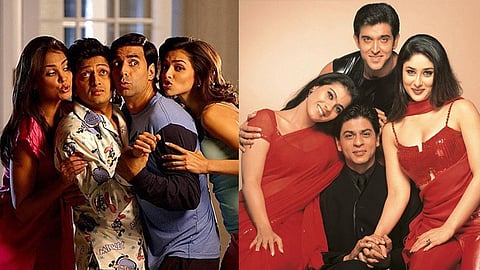
- Reviews
- Power List 2024
- Cannes 2024
- In-Depth Stories
- Web Stories
- News
- FC Lists
- Interviews
- Features
- FC SpecialsFC Specials

In a 2020 study titled “Guilt and Media Use”, Leonard Reinecke and Adrian Meier wrote that one of the reasons certain kinds of entertainment are associated with feelings of guilt is because they’re considered “socially undesirable content” which is “incongruent with other self-aspects”. This is why, for example, a sane-minded pacifist should frown at the over-the-top violence in Dabangg and self-respecting punsters should eye roll at the audacity of naming a character “Aakhri Pasta”. However, the truth of the matter is that despite the social undesirability and incongruence, they’re an absolute joy to watch. Guilty pleasures are a genre unto themselves and wrong as these films may be at many levels, they feel right. Badly-made? Sometimes, yes. Tacky? Frequently. Fatally flawed? 99.99% of the time. But still enjoyable? Always. Here are five masala films that leave us smiling, despite setting off alarm bells in our heads.
Streaming On: Amazon Prime Video
Rajkumar Santoshi’s movie treated its female characters as moral lessons for the male leads, was deliberately crammed with clichés, and is a masterclass in overacting. However, it’s also hilarious in the way it cuts the male ego down to size by making clueless men who think they know what they are doing, the butt of most of the film’s jokes. Swapped identities, fake kidnappings, stolen diamonds, nightcaps with dangling pompoms, a cape-flaunting villain named Crime Master Gogo, it’s all there in Andaz Apna Apna. One of our favourite moments is the scene in which Salman Khan’s character is asked if he has seen Sholay (1975). “Haan, dus baar (Yes, ten times)”, he says, to which Aamir Khan adds, "Iske baap ne likhi hai (His father has written it).” Which, of course, is as accurate as it gets since Khan's father Salim Khan is, in fact, one of the co-writers of Sholay.
Streaming On: Netflix
A stubborn patriarch (Amitabh Bachchan) hellbent on marrying his son into a wealthy family, and a mother who has a spidey sense for her son, a college that’s actually a palace — the ridiculous excess of Karan Johar’s family drama is in a league of its own. There’s a lot in this film that should grate good sense, like the exoticising of Karwa Chauth and the way Kareena Kapoor Khan is made to dress in order to establish she’s a sexy, modern woman. Yet somehow, against all these odds, Kabhi Khushi Kabhie Gham is a delightful watch. There’s Anjali (Kajol), brazen and humorously patriotic. There’s Rahul (Shah Rukh Khan) and Rohan’s (Hrithik Roshan) bromance, and a soundtrack featuring "Shava Shava" and "Bole Chudiyan". We defy you to not sniffle when Rohan is ‘discovers’ by his beloved DJ (Farida Jalal). Sure, the joint family dynamic is a wee bit toxic, but if we have to watch it, let big families be as entertaining as they are in Kabhi Khushi Kabhie Gham.
Streaming On: Amazon Prime Video
A man (Saif Ali Khan) unwilling to take responsibility after getting his girlfriend (Preity Zinta) pregnant should be enough of a reason to deter one from Siddharth Anand’s Salaam Namaste. Fortunately or unfortunately, there’s more to this film. The idea of two successful non-resident Indians meeting in Melbourne, falling in love and living together was all sorts of attractive. Turning lovers into roommates, and going from enemies to engaged, Salaam Namaste is a 160-minute celebration of tropes and it will mess with your head to the point where you start thinking “My Dil Goes Mmmm” is a good lyric, but such is the insidious magic of guilty pleasure movies.
Streaming On: Zee5
Akshay Kumar’s panauti (an unlucky person), Chunky Panday’s Aakhri Pasta, and Arjun Rampal as an intelligence officer — this is where the jokes begin in Sajid Khan’s Housefull (which is a seriously guilty pleasure considering Khan has been accused of sexual harassment by multiple women). We then move on to polygraphs, a baby subjected to Boman Irani’s racist “Aa toh dambar no tukdo che! (He’s as black as tar)”, and more examples of 24K stupidity. Perhaps it’s the appeal of witnessing Kumar, Irani and Riteish Deshmukh slap each other on a loop and do push-ups in sync. Or feeling a deep sense of satisfaction at watching characters spill their truths after inhaling nitrous oxide (imagine the kind of truth bombs we’d get if someone had actually done such a thing on this film’s set). Whatever the reason, the fact is there are few films that let you laugh it off the way Housefull does.
Streaming On: Not Available on Streaming
This film should be a feminist’s nightmare. Who can forget the scene from Abhinav Kashyap’s Dabangg, in which the hero, a chauvinistic police officer, threatens to slap women and (as if that wasn’t enough) also coerces them into marrying him? Fortunately for both the film and the audience’s sanity, there’s Sonakshi Sinha, looking gorgeous and delivering that iconic line, “Thappad se darr nahin lagta saahab pyaar se lagta hai (It’s not the slap that scares me, sir. It’s falling in love)”, which 12 years later is still making the rounds on social media. Filled with contrived situations, over-the-top acting and ridiculously silly jokes, Dabangg is one of those films that’s clever despite being stupid. Take, for instance, the inspired call to not just cast Arbaaz Khan as the loser brother to the hero, but also to name him Makkhi (housefly). Or the fact that Salman Khan’s character is called Chulbul (it’s impressive how many films in the actor’s filmography belong to the guilty pleasure category). Perhaps Dabangg’s greatest achievement is the way Kashyap glorified Salman’s trademarked machismo but also poked fun at it.